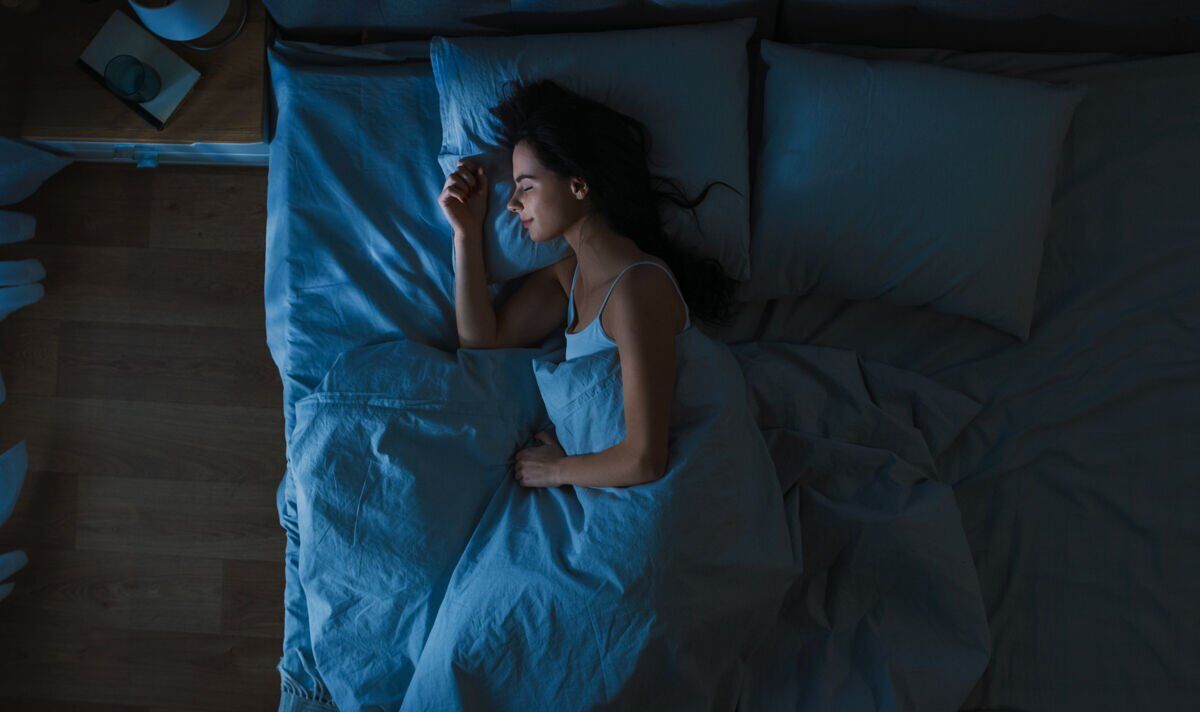Stacey Solomon gets tips and advice from sleep expert
We use your sign-up to provide content in ways you’ve consented to and to improve our understanding of you. This may include adverts from us and 3rd parties based on our understanding. You can unsubscribe at any time. More info
The quality of sleep we achieve is equally important. Dr Lola Tillyaeva (https://lolatill.com/), a doctor in psychology and wellbeing, said: “Humans should go through four sleep phases, making up a cycle of around 90 minutes that repeats itself until we wake up. Every phase of the cycle is important for our minds and bodies, but they each achieve different things.”
Our sleep phases are categorised into rapid eye movement (REM) sleep and non-REM (NREM) sleep.
Dr Tillyaeva explained: “The first three stages of the sleep cycle are NREM sleep, followed by a final phase of REM sleep.
“The first stage is a transition phase as the body begins to ‘doze off’. We don’t typically spend much time in this stage during the night unless our sleep is regularly interrupted.
“It is in the following phase that the body begins to fully relax, and our body temperature, heart rate and breathing decrease.

“Brain waves switch into a new pattern, and eye movement stops. It is a phase categorised by spindles – powerful bursts of brain activity believed to play an important part in memory processes.”
The first two phases of sleep are lighter, and, together, will only last around half an hour, after which our brains will enter the third phase, settling into a slow and deep sleep, said Dr Tillyaeva.
This third NREM phase of the sleep cycle is the body’s regenerative period, which repairs and regrows tissues, bones, and muscles, and strengthens our immune system.
Dr Tillyaeva said: “Some neuroscientists believe this phase helps clear the brain to receive new information the next day. Our brain waves settle into a slow and deep delta wave pattern, making you feel calmer and more empathetic.”
The fourth and final phase of sleep is when we have the most vivid dreams, during which the brain can process the thoughts and experiences of the day.
Dr Tillyaeva said: “This is the REM stage of our sleep that produces beta waves which are very similar to the waves that occur during wakefulness. The body does not move except for the eyes and breathing muscles.
“It starts around 90 minutes after falling asleep and lasts between 10 minutes to an hour.
“While this is not a restful stage of sleep, the REM phase is believed to be essential to cognitive functions like memory, learning and creativity.”

Dr Tillyaeva continued: “Our levels of the stress hormone cortisol are at their lowest during the final three hours of sleep, so if your sleep is cut short, your body and mind don’t get as much of a break from stress.
“And if you feel unrested even after getting eight hours’ sleep, it’s likely that you didn’t get enough deep sleep, as the deep sleep phase is the one that is most disrupted by stress, alcohol, medications and other harmful factors.
“A good night’s sleep must include the full sleep cycle phases to allow for proper restoration and regeneration.”
If you struggle to get to sleep, the Sleep Foundation recommends crafting a pre-bed routine.

It says: “Poor pre-bed habits are a major contributor to insomnia and other sleep problems. Changing these habits can take time, but the effort can pay off by making you more relaxed and ready to fall asleep when bedtime rolls around.
“As much as possible, try to create a consistent routine that you follow each night because this helps reinforce healthy habits and signals to mind and body that bedtime is approaching.”
As part of your routine, it suggests incorporating three things:
Wind down for at least 30 minutes: It’s much easier to doze off smoothly if you are at-ease. Quiet reading, low-impact stretching, listening to soothing music, and relaxation exercises are examples of ways to get into the right frame of mind for sleep.
Lower the lights: Avoiding bright light can help you transition to bedtime and contribute to your body’s production of melatonin, a hormone that promotes sleep.
Disconnect from devices: Tablets, cell phones, and laptops can keep your brain wired, making it hard to truly wind down. The light from these devices can also suppress your natural production of melatonin. As much as possible, try to disconnect for 30 minutes or more before going to bed.
Source: Read Full Article
